#shushing
Text
When staying quiet and undiscovered is imperative but a character is too out of it to realise the situation or be able to constrain themselves:
Whether overcome by unendurable pain so they can't help but moan; gritting their teeth against a scream that forces its way past clenched lips while enduring painful wound-tending; too concussed or drugged to retain awareness of the need for stealth despite frequent reminders; or so lost in feverish delirium they mumble and whimper and cry out at things that aren't even there;
Forcing their companions to desperately try to quiet them, clapping a hand over their mouth, pressing their face to their chest and muffling their cries against their shirt, frantically shushing and soothing them with hands made clumsy by panic, whispering urgently into their ear in a fervent attempt to calm them,
Everyone heart-in-mouth at the character's condition, the companions' helplessness, the possibility of discovery and its consequences, and the sheer tense worry of the situation.
#whumpy text post#original whump#whump community#shushing#muffled cries#pained noises#hiding or hunted#hand over mouth
158 notes
·
View notes
Text
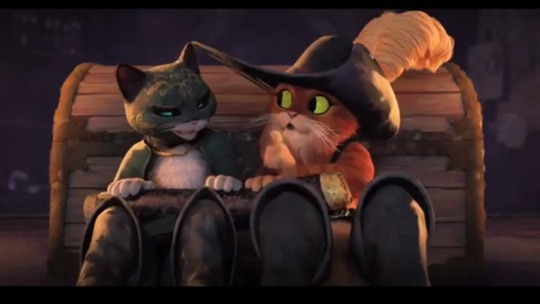
Paused on this and I just had to
#submission#sodacreampuff#otp#annoyed#silly#shh#shushing#goofy#serious and idiot#idiots#seriously#puss in boots the last wish#puss in boots tlw#pibtlw#kitty softpaws#draw your characters#draw your otp#reluctant allies#sitting#serious and silly#draw your ocs#pose reference#draw the ocs#tag your ocs#imagine your ocs#draw your characters like this
141 notes
·
View notes
Text
Fictional Library of the Month: Roubai Academy Library
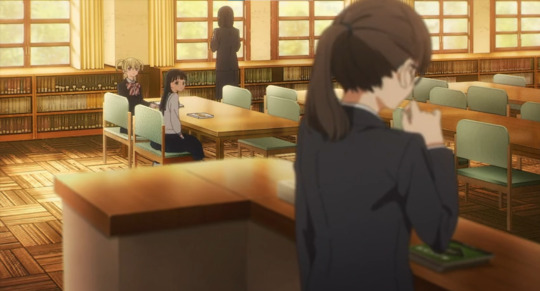
Akebi and Erika look over at the librarian after she shushes them
Hello everyone! This is the eighth edition of my feature series, "Fictional Library of the Month" (see the ones for November, December, January, February, March, April, and May) which includes a post of one fictional library every month, prioritizing currently airing shows, but also including older shows. And with that, this post will focus on the Roubai Academy Library in Akebi's Sailor Uniform.
This post is reprinted from Pop Culture Library Review and Wayback Machine.
About the library
It is a library at the Japanese private school, Roubai Girls' Academy. It is shown to be scholarly and have lots of books to help students. It appears to be well-used and stocked with materials and is well-used by students in the episodes of the series it is shown in. The books are likely organized using the NDC system.
Role in the story
In the episode "Have You Decided on a Club?"; The head of the literature club, Tomono Kojou to be exact, who writes stories, is talking to her friends in the library, and seems to read her books there to students as part of the club. Not much is seen of the library in this episode, unfortunately, as it is a very brief scene.
In the episode, "There's No School Tomorrow, Right?"; Akebi is encouraged by Erika to come to the in the school library. After Erika is impressed by Akebi, a nervous Akebi asks Erika to a fishing trip. They both are excited but the unnamed librarian tells the to keep it down, [1] so they express themselves non-verbally. Both are excited to hang out that upcoming Saturday, the following day, together.
Does the library buck stereotypes?
In the sense that it is well-stocked and has active patrons, i.e. the students, I suppose so. But, the unnamed librarian who shushes the two protagonists fulfills the shushing librarian stereotype. So, on the whole, you could argue it bucks some stereotypes but accepts others.
Any similarity with libraries in other shows?
That's a tough one. I'd have to say it shares some similarities with the school libraries in Classroom of the Elite, Bloom Into You, Whispered Words, Girl Friend Beta, and even the one in Strawberry Panic!, to name a few. But, it is unique in and of itself, so its hard to say that it is exactly like any other library in any other series.
© 2022 Burkely Hermann. All rights reserved.
Notes
[1] In the dub she tells them to keep it down, while in the Japanese original she shushes them. This basically means the same thing.
3 notes
·
View notes
Text
AHAHAHAABABABABAHAHAHAAHAHA
#fucking hell#im#so#overwhelmed#legit got iut of bed less rhan an hour ago what is this AAHAHAHAHA#fuck okah#shushing#giving phone to mom
5 notes
·
View notes
Text
hate when you find a character whose so infuriatingly Your Type that its embarrassing like yeahg no one is gonna be surprised when i announce this is my new Guy Of The Month
#shush jesse#this post abt astarion#hes just so painfully on brand for me#i know so little about him though is the thing but i still feel insane#but i cant play the game and i dont want to watch anyone play it and i dont want spoilers#so like.....secondhand blorbo right now
109K notes
·
View notes
Text
"youve already written that trope" yesss. i like it a lots. i will be writing it again. 1000 stories of the same trope over and over again for ten million years
#'enemies to lovers' BANGER#'one is bridal carrying the other while theyre injured' BANGER#'sacrifice of something important' BANGER#'drunken chapter that results in at least one fist fight' BANGER#theres more but only me and readers who have read all of my fics througout fandoms will help me find the patterns#sara shush
56K notes
·
View notes
Text
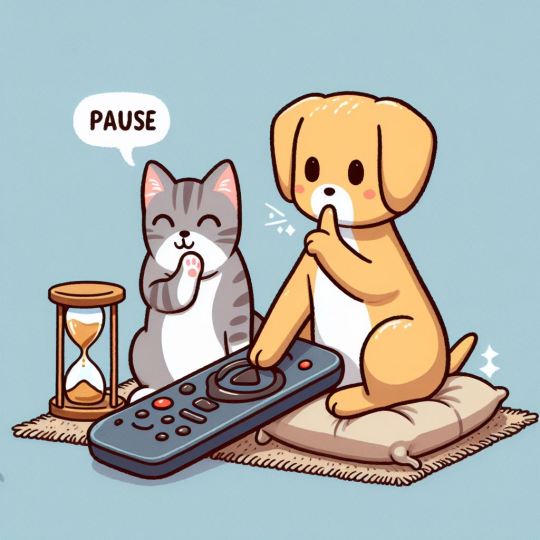
0 notes
Text

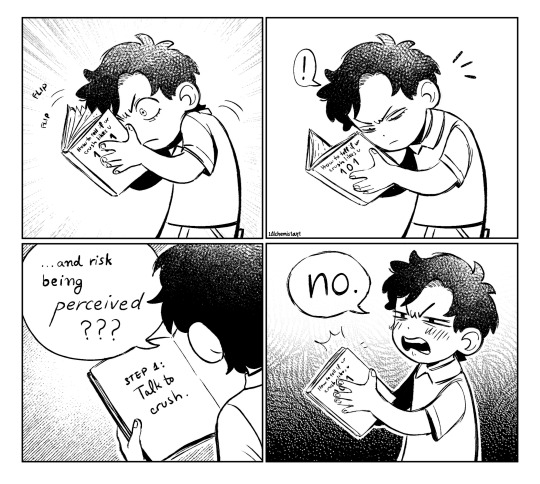
dont got much to offer for The Holiday but have these sillies!
happy valentines day :D
#sxf#spy x family#damianya#damian desmond#anya forger#my art#i am sleepy rn im scheduling this ahead of time like several hours ahead JKSDFKLS#unrelated to sxf. the tags are my speaking place shush#was not expecting the toby fox newsletter to have so much for me to think about JKKLDFSS#good ole gaster sending us love letters (we don't KNOW it's gaster but like. typing pattern + him being the only character to be like)#(directly referring to the game as deltarune)#ALSO THE WEATHERMEN HAVE NAMES NOW ?!?!? AND ARE IN LOVE ???!?!#so happy for them fr#i didnt get the mettaton card but like just know. that is my essence. all those blingee-core sparkles. those picmix hearts. me#anyway YIPPEE WAHOO
7K notes
·
View notes
Text
i hope this doesn’t need to be said but just in case
you might have seen people talking about sudowrite and/or their tool storyengine recently

and just like… don’t. don’t do it. don’t try it out just to see what it’s about.
for two main reasons:
1) never feed anything proprietary into a large language model (LLM, eg ChatGPT, google bard, etc.).
this means don’t give it private company information when you’re at work, but also don’t give it your original writing. that’s your work.
because of the way these language models work, anything you feed into it is part of it now. and yeah, the FAQ says they “don’t claim ownership” over anything and yeah, they give you that reassuring bullshit about how unlikely it is that the exact same sentence will be reconstructed—
but that’s not the point.
do you have an unusual way of constructing sentences? a metaphor you like to use? a writing tic that sets you apart from the rest? anything that gives you a unique writing voice?
feed your writing into an LLM, and the model has your voice now. the model can generate text that sounds like it was written by you and someone else can claim it’s theirs because they gave the model a prompt.
don’t feed the model.
2) the other reason is that sudowrite scraped a bunch of omegaverse fic without consent to build their model and that’s a really shitty thing to do, because it means people weren’t given the chance to choose whether or not to feed the model.
don’t feed the model.
26K notes
·
View notes
Text
in honor of ace week id like to shoutout every asexual who first thought they were bi/pan because they looked at all the genders and felt no difference and zero is equal to zero so they said "huh. must be bisexual" and then shoved their sexuality back under the rug for 3-5 years
#shoutout to not knowing what asexuality was for the entirety of high school#or bonus points if u DID know but everyone around u wanted sex so u didnt want to admit it#anyone who says they knew they were ace from day one is a liar#well not really#but i do question u#asexuality#ace week#ace#aroace#aromanticism#aromantic#asexual#asexuality week#oh shush
87K notes
·
View notes
Text

ethoslab field notes… i love seeing all the little things people do to try and differentiate him lol
#shush slinky#<-not a textpost strictly but it’s in the spirit of one#there are so many others i’m not remembering#a healthy etho population has varied genes!
3K notes
·
View notes
Text
Miss Hatchet, Kim Possible, the complexity of library classification, and technocratic libraries

Ms. Hatchett tells Kim that she has an overdue library book
Recently, I began watching Kim Possible for the first time, apart from one episode: "Overdue." I watched it before I began the series. When I first conceived this post, I thought that I would somehow change my opinion of Miss Hatchet. Long-time readers may recall I previously described her as a person who "rules the school library like a tyrant...[with] her own form of library organization." After watching the episode, I feel no differently about her as I did before. However, I would argue that her character and the plotline says a lot more about libraries than I had previously guessed, meaning that Hatchet is more than a smorgasbord of librarian stereotypes, especially when it comes to library classifications of materials within libraries themselves.
This post is reprinted from Pop Culture Library Review and Wayback Machine.
There is no doubt that this librarian is "wound pretty tight" as Ron, a friend of Kim Possible, and series protagonist with her, remarks later in the episode. She has strict rules, like having a zero tardiness policy when it comes to overdue books. She has an enormous amount of power in the school as she is able to suspend Kim from cheerleading because she has an overdue book! Yikes. All the students seem to fear her and she acts like a villain throughout the episode, first by making Kim shelve stacks upon stacks of books based on her own, and more complicated, library classification system, known as the Hatchet Decimal System (HDS). Second, she takes away Kim's communicator (equivalent to her cell phone) and makes her put adhesive labels on every book saying "property of MHS library." In the end, Ron appears to come to the rescue, returning the book, but it turns out that this is the incorrect one, as it releases evil spirits which terrify her and cause destruction to the library. Her fate after that is unknown. Presumably, Kim and Ron save her life, although that isn't shown on screen.
Even though she is one of the only Middleton High School staff employees shown in the show, Hatchet nothing much more than a basket of stereotypes harmful to librarians while acting like a supervillain of sorts, giving Kim busy work while in "library lockup," as she calls it. Nothing about her is redeemable. However, I would venture that the episode is pointing to something more: the complexity of library classification. This has been an argument that has been rightly pointed out about the Dewey Decimal Classification system (DDC) have made in the past. This is despite the fact that this library classification system organizes to materials by subject. It can be hard for those who don't know the intricacies of DDC, like ordinary library patrons, to understand how books are organized. [1]
In 2007, the Library of Congress warned of limiting the use of the number components field so that doesn't become "confusing and complicated." Some years earlier, scholars Luc Beaudoin, Marc-Antoine Parent, and Louis C. Vroomen described DDC as a huge and complex information hierarchy. [2] Additional classification systems have also been noted as complex. For instance, some said that the Library of Congress Classification System (LCC) [3] is more efficient and specific for new technical material and big collections but "more complex." Others described the effort by Belgians Paul Otlet and Henri La Fontaine, who used the DDC as a basis, to create the "complex multidimensional indexing system" known as the Universal Bibliographic Repertory (UBR). [4]
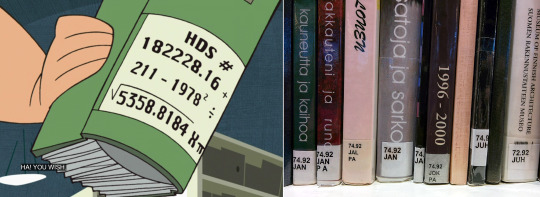
The Hatchet Decimal System on a book binding on the left and the DDC on a book bindings on the right. The latter is from this image on Wikimedia.
To come back to the episode, I would say that the focus on a classification system that Hatchet made by herself is meant to point to the complexity of library classification systems in general and how they can be confusing for ordinary people, in this case Kim. Her system is clearly more complex than the DDC and perhaps that is part of the point of this episode, which was written by Jim Peterson, directed by Steve Loter (who directs many of the episodes in the series), and storyboarded by Eugene Salandra, Jennifer Graves & Robert Pratt. It is incredible that Hatchet has enough authority that she can create her own system for organizing books in the library, which has become "her natural habitat" as it states on her short Kim Possible fandom page. Many librarians would not have that ability as their actions would be hemmed in by school administrators, school boards, national and state library associations, which have their own codes of ethics.
As Anne Gooding-Call has pointed out, "librarians of color don’t necessarily have the same support that white librarians enjoy," with the MLIS and middling wages as a barrier to many. This is undoubtedly the case for Hatchet, who the school probably would have treated differently had she been Black, Latine, or Asian, for instance, as most of the librarian field is composed of White female librarians. She would not have the social support of other White people, even if the students feared her. In one way, the library that Hatchet occupies appears to be a white space, meaning somewhere that Black people may be reluctant to ask questions or use resources. On another, since students generally fear her, no one, of any race, may be asking her questions or for any help. Instead, they are presumably trying to spend the least amount of time in the library as possible, as they are afraid of her. I would even argue that if she wasn't White, she couldn't be as mean and menacing to the students, at least I would hope that would be the case.
Beyond this, there is no doubt in my mind that Hatchet obviously blatantly violates tenets 1, 6, 7, 8, and 9, at minimum, of the ALA's Code of Ethics. This is not unique to her, as others are even worse offenders. [5] For instance, Francis Clara Censorsdoll in Moral Orel dipped "objectionable" books in kerosene and set them on fire. Cletus Bookworm in Rocky & Bullwinkle had no problem with an armed man taking two patrons of the library hostage. In fact, he encouraged their capture and applauded it. That's just two of the most egregious examples I can think of, although there are many others. Gooding-Call says that librarians are mostly "sincere people who mean well...eager to grow and improve" who can become "vehicles of empowerment." Hatchet does not seem to be this at all. Instead, she seems overly strict and harsh, not wanting to improve. She is the female equivalent of Steven Barkin, a former U.S. Army Ranger, who has a gruff, no-nonsense, attitude, and is abrasive with students in the series. Unlike Barkin, it is unlikely she has PTSD from wartime experiences.
There is the additional issue that the DDC system and other cataloging approaches were "designed in a racist and white-centered system," [6] building upon my post in May about fictional acceptance of the DDC. Hatchet probably didn't care much about this. Instead, what matters to her was lording this power over other people in a menacing way, or at least it appears that way. She says as much, as she declares to Kim that "There will come a day when you forget to return a book and I'll be waiting for you." It gives you the chills. Was she so self-centered that she created her own classification system? Did she care that DDC is, as Emily Ruth Brown points out, built around adult disciplines, is proprietary, and is negatively affected by changes in technology? We can't know for sure, as she is a one-time character who never re-appears in the series. This isn't surprising, given that Western animation has a habit of easily playing into librarian stereotypes, although this may be changing, with libraries shown much more positively in anime.
As I expected, not one person has written a fan fiction about Ms. Hatchet in Kim Possible on Archive of Our Own, even though it could make an interesting story to see things from her perspective. Clearly her actions toward Kim, and presumed other students, are irredeemable. Even so, she may be under a lot of stress as the only librarian of the entire Middleton High School library, at least the only one we see as the audience. If she had been trying to get Kim to do extra work, like shelving books, then this was definitely not the way to go about it. There are the other library scenes in the series, but she never re-appears. She is never given a chance to redeem herself or for the audience to see who she is as a person. She is just a bunch of stereotypes all shoved into one person. I admit that I may be reading too much into this 11-minute episode. At the same time, this episode may be more than what it appears to be on the surface and interconnects with issues surrounding library classification systems and even broader issues within the library field itself.
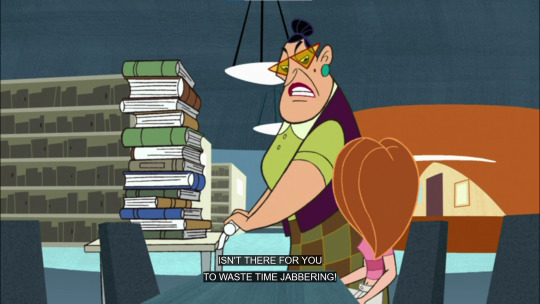
Ms. Hatchet pushes a book cart piled high with books
When I first composed and finished this post in later February 2022, my last paragraph was the end of the article. However, I see Hatchet's classification in a new light after reading a chapter by Rafia Marza and Maura Seale about White masculinity and "the technocratic library of the future" in Topographies of Whiteness. Although she is no technocrat, and neither are any of those on List of fictional librarians I have put together for this blog as most are either "old-school", "traditional", or "magical" for the most part, her complex HDS is akin to technocratic ideas. Marza and Seale note that as information technology has become a bigger part of librarianship in the 1990s and 2000s, the White female librarian has been replaced by ideas from Silicon Valley, with "technological solutions" which will supposedly free us. They further said that such a focus on technology as a "solution to complex social problems" is central to technocratic ideas, which is characterized by its "impartial, apolitical rationality," with those who are technocrats interests in politics rather than efficiency, thinking that technological fixes can be universal. However, this ideology is bound up in White supremacy because White men have historically claimed rationality and White masculinity has been able to function as the "universal form," while it can only claim to be neutral and objective due to Whiteness. At the same time it upholds patriarchy as well. [7] This interlinks with the historic investment of libraries in Whiteness and faulty notions such as rationality, objectivity, neutrality, and neoliberal tendencies. The latter is promoted by two ALA initiatives: Libraries Transform and the Center of the Future of Libraries (launched in 2015).
Such initiatives, Marza and Seale argue, engage internet-centrism, an idea described by Morozov as the idea that everything is changed and there needs to be fixes, while technology is permanent, fixed, has an inherent nature, and possess agency as it exists "outside of history." They are interconnected to technological solutionism, the idea that all complex social problems can be neatly defined and have definite solutions or processes that "can be easily optimized," even though this can undermine support for more demanding or stimulating reform projects. [8] This comes with the assumption that it is neutral and objective, even though it is anything but that. This is reinforced by a focus on digital and quantitative skills, with an individual and "entrepreneurial" worker as the default, who are often male and White, especially when it comes to those in Silicon Valley, who are used as a basis for these "necessary" skill sets. At the same time, care and emotion work, service work, manual labor, and so on are seen as "feminized labor" At the same time, libraries are seen as akin those businesses in the so-called sharing economy, with racial prejudice as ingrained in such an economy, and labor of people of color and White women not visible due to the emphasis on technology and de-emphasis on the labor behind the technology itself, with its deadly environmental and labor consequences. [9]
While labor of those causing the technological solutions to be workable is erased, so is any quiet or reflective work, like that portrayed in Kokoro Library, while fewer workers are told to take on more work, leading to burnout. Additionally, libraries are viewed as platforms, like the sites created by Silicon Valley, which ends up prioritizing monetization and obscures any libraries seen as "non-technological," pay is low, and librarianship itself is devalued while technocratic ideology is risen, and the value of library degrees has declined while information technology is seen as even more paramount. This is only strengthened with a focus on "short-term results," market demands, just-in-time services, efficiency, and "return on investment," even as emotional labor of women and physical labor of people of color is needed to make sure libraries, and society as a whole, function. In the end, such technocratic ideas are embedded in systems of privilege, while technology itself is subject to the same inequities as the rest of the world, with a necessary situated and historic understanding of technology and librarianship, and ways that both of those concepts "intersect with dominant conceptions of white masculinity." [10]
Hatchet clearly does not embody any of this technocratic ideology, nor has any librarian I've ever seen in any popular culture I've come across to date. However, her ideas would fit right in with today's technocratic push in librarianship, with their own inherent complexity. In fact, if the episode was to be done again today, it would not be a stretch to see Hatchet using robots to shelve the books in their own complex way, or even sitting at her desk while she ordered a robot to snatch Kim and bring her to the library in punishment for an overdue book. That may be a bit extreme, but the point is that her ideas fit within those who espouse technocratic ideas about libraries at the present. Ultimately, I enjoyed reexamining this episode and I look forward to your comments, criticisms, and anything else you'd like to leave in response to this post. Until next time!
© 2022 Burkely Hermann. All rights reserved.
Notes
[1] Erin Sterling, "The Case of the Clunky Classification: The Elusive Graphic Novel," May 2010, accessed February 25, 2022; "Dewey Decimal System," ScienceDirect, accessed February 25, 2022; "Information Literacy Tutorial: Finding Books," University of Illinois Library, University of Illinois, LibGuides, Aug. 7, 2018, accessed February 25, 2022; Melinda Buterbaugh, "Lesson Three: Dewey Decimal Classification (DDC) and Call Numbers," Library Practice 101, accessed February 25, 2022; "Teach Me How To Dewey," Hillsborough County, Florida, Dec. 13, 2017, accessed February 25, 2022; "Why I Would Use Dewey," Technical Processes for Education Media, Oct. 29, 2011, accessed February 25, 2022.
[2] Luc Beaudoin, Marc-Antoine Parent, and Louis C. Vroomen (1996), "Cheops: A Complex Explorer for Complex Hierarchies," IEEE, p. 87; "MARC DISCUSSION PAPER NO. 2007-DP06," Library of Congress, Jun. 6, 2007, accessed February 25, 2022.
[3] Not the same as the Library of Congress Subject Headings (LCSH) which has "been actively maintained since 1898 to catalog materials held at the Library of Congress" and said to be the "most widely adopted subject indexing language in the world." LCSH describes contents systemically, while LCC is a library classification system. Its also different from the Library of Congress Control Number (LCCN), a serially based system of numbering cataloged record.
[4] Robert McCoppin, "Who's killing the Dewey decimal system?," Chicago Tribune, Feb. 18, 2011, accessed February 25, 2022; Gerry le Roux, "Melvil Dewey and the classification of knowledge," Science Lens, Dec. 10, 2012, accessed February 25, 2022; ; "How the index card launched the information age," Multimediaman, Sept. 10, 2016, accessed February 25, 2022.
[5] Discounting the shushers, the most extreme include the librarian in multiple episodes of Kick Buttowski: Suburban Daredevil, Rita Loud in a Timon & Pumbaa episode ("Library Brouhaha"), Mr. Snellson in a Mysticons episode ("Happily Never After"), Librarian in a Big City Greens episode ("Quiet Please"), Librarian in a Courage the Cowardly Dog episode ("Wrath of the Librarian"), and Bat Librarian in Rise of the Teenage Mutant Ninja Turtles episode ("Mystic Library").
[6] "Conducting research through an anti-racism lens," University of Minnesota Libraries, University of Minnesota, Feb. 15, 2022, accessed February 25, 2022. Others have claimed that DDC can be reformed with librarians who have "deeply held values of equity, diversity, and inclusion" while others have pointed to racism within the DDC, by Dewey himself, noted Dewey was a sexual harasser and a clearly a bigot without any question. Even conservatives have pointed out that Dewey is ingrained in librarianship and there is no escaping him.
[7] Rafia Mirza and Maura Seale, "Who Killed the World?: White Masculinity and the Technocratic Library of the Future" within Topographies of Whiteness: Mapping Whiteness in Library and Information Science (ed. Gina Schlesselman-Tarango, Library Juice Press: Sacramento, CA: 2017), pp. 175-177. They also say on page 175 that in the early 20th century, librarians participated in "civilizing" and assimilating the "tired, huddled masses into American democracy" as long as those people could become White.
[8] Mirza and Seale, "Who Killed the World?", pp. 177-181. Libraries Transform describes itself as "spreading the word about the impact libraries and librarians make every day...[and] advocat[ing] for the value of librarianship" but the about page almost reads like a corporate webpage, and not surprising as Overdrive is the lead sponsor, with other big sponsors including Capital One, Dollar General, Biblioboard, and SAGE Publishing. The same can be said about the webpage of the Center of the Future of Libraries.
[9] Ibid, 181-5.
[10] Ibid, 186-192.
#kim possible#librarians#librarian stereotypes#stereotypes#library classification#libraries#fiction#pop culture#dewey decimal system#library of congress#loc#ethics#moral orel#rocky and bullwinkle#archive of our own#shushing
6 notes
·
View notes
Text
Steve watched Eddie's van turn the corner and shut the front door, closing himself away from the outside world so none of his neighbors could see him as he rested his forehead against the painted wood.
"I'm not going to cry," he told himself.
He said it even as his eyes began to burn and his face began to twist, teeth grinding and throat closing. He wiped quickly at his face, again and again, as he stumbled to the couch to sit, drying each tear as it rolled down his cheeks, clinging to his jaw.
"I'm not going to fucking cry," Steve choked, and then doubled over into himself, arms around his thighs, and he began to sob.
So what if he was twenty-two, living in his parent's house alone, working the same dead-end job with a sixteen year old manager. So what if all his friends and family were in college, spread out from New York to Chicago to Los Angeles. So what if his boyfriend was moving to Seattle for his band and they broke up, because Steve was never going to be his parents, resenting and being resented for keeping his partner from his dreams. So what if he was too scared to ask Eddie to stay, to ask Eddie if Steve could go with him. So what if everyone moved on and Steve couldn't?
Steve grew up lonely. He could get used to it again.
He didn't realize how hard he was crying until the front door burst back open and Eddie hurled himself at Steve's feet, long limbed and clumsy and babbling.
"Baby, oh fuck, I'm sorry," he said, already untangling Steve from himself, tying all his loose ends back up together with his until they were a knot of their own. "I'm sorry, I'm sorry, Stevie. I never should have— I wanted to—"
"I'm sorry," Steve sobbed back. He gasped and swallowed it all back down. Eddie had already gotten them raveled up again, it would take forever to pick it back apart. Steve knew it would hurt worse this time. "Fuck, Ed, you didn't have to— I'll be okay, I don't want to hold you back—"
"Come with me," Eddie burst.
And Steve couldn't help himself, and began to sob again.
"Please," Eddie begged over Steve's crying, his voice shaking and his face wet enough to match Steve's. "Please, sweetheart, honey, please just come with me?"
Steve took a shaky breath, embarrassed and now too full of hope and fear. "You sure?" he whispered. He pressed his face into Eddie's neck, breathing him in again for what might be the last time, again. "Eddie, don't—"
"I'm so sure," Eddie said. "I'm so fucking sure, Steve, please."
"Okay," Steve breathed. Eddie had always been the braver of the two of them, especially when it counted. Steve leaned back so he could look at him, red faced and watery eyes. He tried to give Eddie a smile, but he knew it was wobbly and weak. "Okay."
All of Steve's fears meant nothing as he watched the happiness break like dawn over Eddie's face.
#steddie#my fic#shush mal#something something once again about eddie being the bravest when it comes to love something something#anyways they pack steve's shit that night and leave early the next morning to make up for eddie's lost time to get to wherever he's going#and they live happily ever after amen
3K notes
·
View notes
Text

purgatory flight
(wings are based on my post from a few days ago about them getting healed by the end void)
#qsmp#qsmp philza#qsmp tubbo#qsmp purgatory#ok so#this WAS originally fanart for yesterday#but shush#can you tell i suck at background rendering#rendering in general IM AN ANIMATOR DAMMIT
4K notes
·
View notes
Text
"the 'power of love' trope is such an overused and cliche gimmick" i do not care i will love it always and forever. love prevails and explodes the enemy
48K notes
·
View notes
